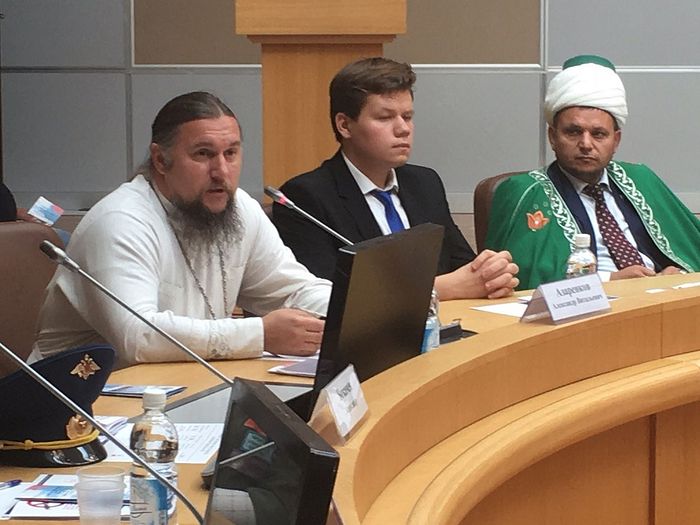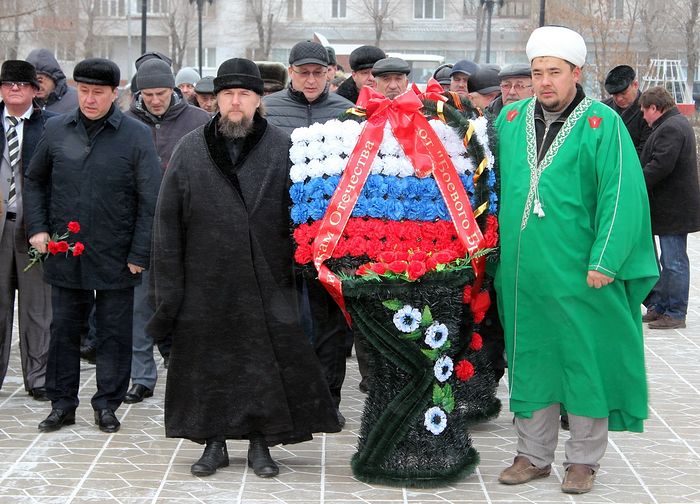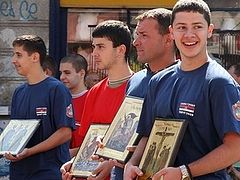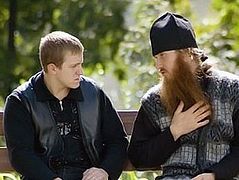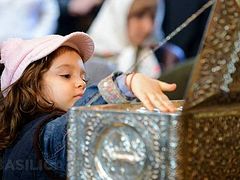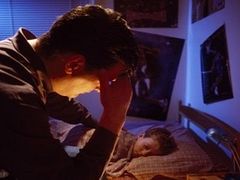The “Seven Life Lessons” social awareness-raising project has been active in Orenburg province for three years now. The project organizes a great number of various educational events for the people of the province. The main goal of the events is to develop and strengthen, primarily in children, values that are seemingly obvious and understandable to everyone, for without such things as politeness, mercy, faithfulness and respect for elders, our life would turn into hell. The project was founded by Priest Alexander Azarenkov, the head of the Church Charity and Social Services Department of the Orenburg Diocese. He believes that, “In order to breathe clean air, we must first produce it; i.e. we need forests, parks and woods that produce this fresh air for us. In a way, this project functions as a “park” and the more vegetation we have there, the better it is for the people who are often beleaguered by rudeness, treachery, and other sinful dirt.”
—Father Alexander, how and why did the “Seven Life Lessons” social project come to be? Whose idea was it to create such heart-warming videos?
—This project was initiated by my friends and me. As to why… I think that we must be constantly reminding ourselves about things that are as plain as day. That is, we must remember that we are human and as such, we must behave accordingly. I think that in our age of information and computer technology we can use this technology to remind us about that. Just like any tool, technology can be used for either good or bad purposes. As an example of the latter, we can mention all those “color” revolutions that have taken thousands of lives. However, if we channel the potential of information technologies toward the good, we would be able to save many people, wouldn’t we?
I have looked at the way electoral campaign headquarters operate: they have political analysts and sociologists working to make a certain person popular. So I thought, why don’t we take these information technologies and use them in a positive way? Instead of speaking about some candidate for high office, we would be promoting elementary, basic values without which our life in this society would be similar to living in a concentration camp.
—So, if I understand you correctly, you use the technologies just like any tool, i.e. an axe, a hammer, etc.?
—Absolutely. These technologies were my tools. You can use an axe and a hammer to fight in the war or you can use them to build a house. I would prefer that tools be used only for peaceful purposes.
Let us first become people who can at least look at the sky and think about the Heavenly Kingdom.
The situation in the region we live in is challenging because there are people of many ethnic backgrounds and all of them have their own interests. You can’t just convert them all to Orthodoxy. That would be wrong. You can’t force people into believing in the Heavenly Kingdom, so let us first become people who can at least look at the sky and think about it. That was how this project came to be. I understood that this project was a viable initiative worthy of promotion. We started working on it and, as you see, the project is quite successful.
—You said that the situation in the region was challenging and the relationship between people was complicated. How did you, an Orthodox priest, find some common ground with people of different faiths?
—I was working in a small regional center for a while. The situation in the region was not simply challenging, it was extremely challenging. There were many atheists and people of different faiths. So, I came to the administration of the regional center and said that I had a Masters degree in sports, in kickboxing, and that I would like to start a sports club for children. This was the first step I made towards people. It really helped, and two months later, several representatives of the Muslim community came to me and said, “We are willing to make donations to your church as long as our children lead healthy lives and excel at sports.” There were kids from various families in the club, including Orthodox, Muslims and atheists… In three years, we reached the international level. Anyway, when I came with this proposal to the regional center, they said, “Sure, we don’t mind, you can start training.” When I started doing it, I realized that sport plays an important role. Gradually, I started to teach people about the Church…
We thought about this project when I was already working as a priest in Orenburg. We started advertising this project wherever we could and it became well known. When I walk into a school, the children cry, “Look, it’s the guy from ‘Seven Life Lessons’!”
—Why did you call it the “Seven Life Lessons”? What are those lessons?
—It’s a certain reference to school lessons. Our main target audience is children and youths. There are seven full study months in the academic year. This project is only a means to an end, and not an end in itself. We create a kind of large informational sphere over Orenburg Province. Every month of the academic year, we focus on a certain virtue. The topics are as follows: “Honour your father and your mother” (about children’s relationship with their parents), “Fathers, provoke not your children to anger” (fundamentals of harmonious upbringing of children), “Love your neighbor as yourself” (harmonious interpersonal relations), “In the beginning was the Word” (humanitarian culture as an inseparable part of personal development), “On chastity” (interaction between men and women in marriage), “Thou shalt not make unto thee any graven image,” (problems of various addictions like alcohol, drugs, etc.), and “All is vanity” (people’s search for the meaning of life).
For example, in October the topic is Mercy, so every TV channel and every movie theater would play the “Seven Life Lessons. Mercy” video before playing any movie. When you come to a bus stop, the loudspeaker will be talking about the video. In your car you’ll hear the commercial on the radio about Seven Life Lessons. When you walk into your apartment building, you will see our posters in the elevators. There is advertising in the trolleybuses too. There are about one hundred trolleybuses, and each carries two ads of the Seven Life Lessons. There are billboards, small and large banners …
—Father, why do you think the administration of the province agreed to do this? Why didn’t they just brush it aside?
—I think they saw the benefits of this project. Besides, popularity plays an important role, even though I want to escape from it. Really, I don’t like publicity, but I have to use it because I’m also the Vice President of the Motor Sport Federation of the Orenburgskaya Province and an active racer.
—So in addition to being a kickboxer, you’re also a racer?
Yes, I have I am a Candidate for a Master of Sports degree in car racing. I participated in the Championship of Russia. I appeared live on TV and organized many interesting events. I’m not sure if this is good or bad, but during this time I have become quite a celebrity. Accordingly, I made many friends and acquaintances among various government authorities and practically everywhere.
This is what we did at the beginning of the project: We organized a large press conference, invited many of our opponents, and asked them to think about the following question: “As a person and a citizen, do I have the right to voice my own opinion?” They said, “Well, yes.” “So why don’t we all, Muslims, Atheists and Christians, talk about the things that are equally important for all of us? Do you agree?” And they agreed. About 50 partners were involved in the project and we all got together, putting aside our confessional differences, personal preferences, etc.
—In simple terms, Christians, Muslims and people of any other confession would be equally upset if drivers didn’t give way to pedestrians?
—Absolutely. We described this project as an initiative to promote basic values. To be honest, this is not a religious project. However, since I am a priest, when I visit schools or universities as one of the founders of this project, I always wear my ryassa [outer cassock] and never take it off.
—Why? You don’t always see that nowadays. Young priests often prefer to wear secular clothes. Yet here you are, a kickboxer and a racer, wearing a ryassa…
When people see a priest, they can’t help but ask him the most important questions.
—Well, it is as if I’m delivering a sermon, so I always wear my ryassa in the city. The life of a priest, as well as any Orthodox Christian, is always a sermon. I believe that the “Seven Life Lessons” project presents a great opportunity to start talking about Christ. It is like an “admittance ticket,” if you will. I was very surprised when at one large meeting (attended by more than five hundred young people) the children and youths started asking questions about faith and God. What can I answer them if I stand there in a suit while they know that I am a priest? There will be an inconsistency. So I simply can’t live without the sermon, for when people see a priest they can’t help but ask him the most important questions.
—How old are the kids?
—It varies. I remember I once had a meeting with fourth graders. I was really amazed by their interest and understanding. And you know what is the additional benefit? Developing patriotism. At our sessions, we ask the schoolchildren, “Do you love Russia?” They answer, ‘Well, yes.” Then we ask them, “Would you like to participate in a war to liberate it?” It is obvious that there is a real war going on against our country. It is an information war, but it doesn’t make it any less serious. We explained to the children how the information technologies work, using their own language. “There are different types of wars. Do you want to participate and conquer this invisible enemy?” “Yes, we do, but how?” “I suggest that you start today, with this lesson of mercy.” And we tell them about being merciful. We ask them, “Are you ready to be together with us?” So, we try to involve them in finding the solutions to our problems.
—If you don’t mind me asking, how much does all this cost? The project involving the use of TV commercials as well as billboards, books and leaflets must be expensive…
—It is quite expensive. Thank God that people see the need to support this project. They see its benefits, so they help. When we did our calculations, we estimated that the full-fledged operation of this project requires approximately 10 million roubles per month. Not cash payable to us, of course, but the funds to pay for TV commercials, printing, etc. Obviously, we understood that this was not a one-person job and help would be needed. So we decided: Let’s start and launch the project, and then we’ll find people who will be interested in helping us show our videos during prime time. We don’t need direct money transfers, for the goal of this project is not to make profit, but to make everybody’s life easier so that people at least respected each other. This attitude must be developed in early childhood. We believe that we have to reach a very young audience, so we are currently planning to publish coloring books. We met with the most famous artist in Orenburg and he said that within a year we could organize a contest for the best picture. That way we will keep the “Seven Life Lessons” brand active. We’ll make coloring books for each topic, e.g. Mercy, Industriousness, etc. That way the young audience, including kindergarteners, will be covered. Cartoons are also important. We met with the producer of the Smeshariki cartoon and had a very good talk. He liked the idea very much. He told us many interesting things and gave some recommendations. So now we are planning to follow them. You know how Americans are doing it? Whenever you walk into a store, you see those hyped-up cartoon monsters, etc. Why can’t we use the same approach but promote our good characters? We understood that if we simply streamline our efforts and combine them with the good will of people, then we could achieve amazing results for sure.
We all absolutely need a good and friendly environment, and this includes informational environment.
A pediatric psychologist who is working on reducing the number of child suicides joined our project. We offered him to make a video together that would help children value their lives. What is the message of the video? We all need a good and friendly environment and this includes an informational environment. Simply put, it means, “people, let’s smile to each other and this will make our lives more joyful and bright!”
—Does everybody share this position of yours?
—Well, I don’t think this project has the full understanding and support of the diocese yet. Sometimes I hear people wonder, “Why do we need it at all?” It is very sad to hear, believe me. One would expect the Orthodox people to be the primary source of support, however…
—Father, what do you think is the reason for such difference of opinions among the Christians?
—We miss the most important thing—prayer. We need real prayer and we need worship services. This is the main thing. Nowadays they are giving tasks, objectives and instructions to priests and often they are assigned to people who don’t understand anything in these instructions. These people are not professionals and many of them shouldn’t even enter schools because they would just make it worse. We’ve had to do a lot work to fix the mistakes of such people…
Frankly speaking, sometimes we even feel downright hatred towards us priests. Contempt and hatred. I think that this is caused by non-Christian behavior of the Christians themselves.
—So how do you make these people change their attitudes?
—You need to talk to them honestly and patiently. Frankly speaking, these attitudes are not always unfounded. We Christians are in many ways to blame for making people feel that way. I used to try to prove them wrong in various ways and developed all sorts of techniques to change that attitude. Nowadays I am invited to TV and radio programs, but at first people were violently opposed to the idea. However, we [the media personnel and I] have become friends and now we keep on talking for about an hour after each program. And suddenly I realized: God, why do I try to conceal things, why do I find excuses, when this doesn’t change anything? You can’t hide anything anyway. So I stopped finding excuses and started telling the truth as it is. And you know, the truth is better. Often our unworthy behavior discredits Christ, and this is the most terrible sin, the betrayal of Christ.
When I am making a presentation somewhere and see people’s antagonism against the Church, I tell them, “You know, when you come to a forest, you do that to get a breath of fresh air. If you get there and see a dead animal, would you just turn around and go home? Or there could be mushroom pickers shouting or drunken hunters making noise. You go there for the fresh air, not to see some drunks. This fresh air is like God’s blessing in the church, Communion, and Confession. Sometimes people do understand that it doesn’t matter that there are some sinful Orthodox people, for there is Christ, after all! After that, sometimes people could go as far as to look at themselves with more critical and honest eyes and appreciate the words of the Psalmist, But I am a worm, and no man. Still, it is very sad to see people who have such antagonism, of course.
—Let’s talk again about the high cost of the project. Is it worth it? Would it be true if we say, Father, that even if the project costs maybe a million roubles, spending a million for a good cause is cheaper than spending hundred of millions on rehabilitation or funerals for victims of aggression?
—Absolutely. I fully agree with you. It is much cheaper and better to spend the money on promoting the right behavior in the society, in school, on the road, etc., rather than being shocked later and spending billions on all sorts of penalties, rehabilitations, funerals… Mutual kindness is worth the money spent and it is safer this way.
In fact, such kindness can stop any terrorist aggression or at least, considerably reduce the crime rate. To be honest, when we go out in the street, we don’t feel very comfortable. We are literally bombarded by the propaganda of violence and vulgarity from everywhere. If we learn to smile, hold the door open for somebody or give way to somebody, the world around us would start changing for the better. I am sure of it. If people get used to being kind, a lot more time would be needed to make them aggressive. Upholding these basic, simplest values would save thousands of lives. So why can’t we make these values fashionable?
—So we are talking about our national security, even if it sounds pretentious?
—Absolutely. We do hope that our idea would become popular in not only Orenburg and our province, but throughout the entire country.
—Tell me, Father, are the videos intentionally so short, at 20 seconds each?
—No, it is the requirement of the genre and TV channel owners. Besides, since the video is short, we try to include only the most important things, without unnecessary “bells and whistles”. So far, we have succeeded.
—Are you the one who comes up with the plots for the videos?
—We work with a professional company. The work process is as follows: We give them a new idea or a topic—for example, Mercy, and that’s it. They work on it and then send us 10-15 prepared versions. We select the one that we believe better matches the goal of the project. That was how our 15 videos were made.
—Is there a video that you like most of all, one that seems to be the most pertinent in the current situation?
—Well, they are all pertinent and I like them all. Take, for example, “Honour thy father and mother, that it may be well with thee, and thou mayest live long on the earth.” This is very important, so when I talk to kids at our presentations, I ask them, “Guys, do you want to have a long life?” “Yes!” “Do you want to live normally and get a decent salary?” “Yes!” “So here it is: Honour thy father and mother, that it may be well with thee, and thou mayest live long on the earth. Do you want to live a long life? It doesn’t matter if you do sports or live in the Caucasus mountains. You will live long if you honor your father and mother.” Do you know how powerful such motivation is for them! I tell them, “Like it or not, you have to honor your parents. There are certain things you need to do every day.” They say, “Yes, we agree.” Even though this motivation of children is quite simple, it is still effective: If you want to have a good life, love your parents.
We also had another topic: “Fathers, provoke not your children to anger”. This topic is also very important. We had a banner—parents are standing on the left and on the right facing each other. You don’t see their faces, they are just angry looking silhouettes. And between them there is a crying girl. Her tears are very expressive. This is tough, of course, but still effective.
—Do you think that the words of Elder Emilian from Simonos Petra Monastery are still applicable? He said, “If you can’t be saints, be at least polite.” Can a simple secular politeness somehow help people get closer to Christ?
—You know, everything depends on why a person behaves politely. What are the reasons and motives? Is this person sincerely polite or is he or she being hypocritical? You know, there was Someone who took the whip and kicked the merchants out of a temple…
Politeness maybe a step we can take to see the image of God in the people we talk to.
Politeness is important, of course. I think it can often be a step we can take to see the image of God in the people we talk to. If you see the image of God in a person, you can’t help but smile. Politeness, discreteness and tactfulness can go a long way. I’ll give you an example from my family life. Once we walked into a mall, and saw Monster High dolls in a shop, those colorful scary monsters. My daughter said, “Daddy, I want to buy this doll, I like it a lot.” I said, “Of course, Dasha, let’s buy it, why not.” You know, when people have set their minds on doing something, you should never push and force them do something against their will, because that will only make them feel anger, irritation, protest and indignation. I bought the doll for her and she was very happy. Later when I was driving the kids to school, I started delicately, in a roundabout way, explaining what these monsters represent. A week later she said, “Daddy, why didn’t you tell me earlier that this doll was bad, how could you buy it? Let’s throw away this awful thing!” It is better that she made the right decision on her own rather than under my pressure. The same is applicable to other people: They must make the right decisions on their own. Of course, often some help from a respected person is needed to make it, but that person can’t be authoritarian. The other day, people from the traffic police asked me to help them boost traffic safety awareness among teenagers. I agreed, of course. As a priest, a car racer, an athlete and a kickboxer, I tell the teenagers, “Guys, I observe the traffic rules, and so should you. If you want to show how cool you are, come to our racing track and prove yourself there. If you want to show off, then fight in the boxing ring with your equals, rather than at school or in the streets. Anyway, they understood that they were wrong. Hurray!
—Would you like to wish something to the readers of our website?
—Of course. Love each other, please. Be polite to each other. Politeness is not only a sign of being civilized, but also the sign of love we all need so much these days. God save you.

